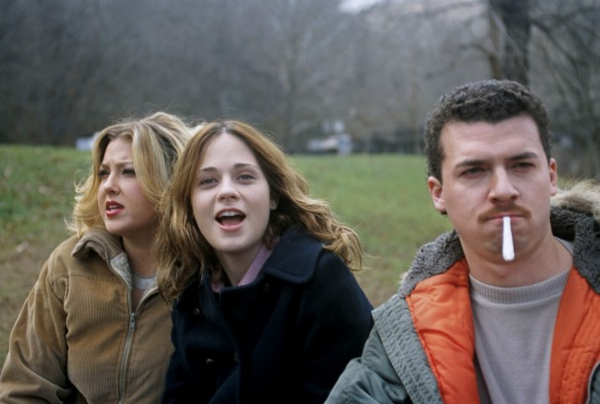Movie review by Greg Carlson
It’s easy, sometimes, to forget that David Gordon Green is still a young man in his late 20s. “All the Real Girls” is only his second feature, following the haunting “George Washington,” but it resonates with a careful, unhurried patience that few filmmakers of Green’s generation are likely to be able to demonstrate to an audience, even if they wanted to. While Green is certainly not the first film school attendee to gulp down extra helpings of Terrence Malick en route to the development of a directorial style, he is undoubtedly one of the best. Both “George Washington” and “All the Real Girls” construct tiny universes out of their small, North Carolina milltowns that border on the astonishing in their authenticity.
While “George Washington” dealt with the tragedy attending the accidental death of a child, “All the Real Girls” dissects the heady confusion that swirls around falling in and out of love. Paul (Paul Schneider, who also co-wrote the story with director Green) is a directionless kid who has managed to bed every available young woman in the area – more than twenty by his count – despite the fact that he still lives with his mother. Noel (Zooey Deschanel) is the virginal 18-year-old sister of Paul’s best pal Tip (Shea Wingham, rocking an impressive pompadour).
If you think you can guess with some certainty the sorts of things that will happen next, you would probably be right. But Green is not interested in machine-tooling some kind of contrived revelation or unexpected shock. In his own quietly contemplative manner, he wants to see how his characters will behave under the most usual of circumstances. Respecting the regular, commonplace ordinariness of daily life, Green uncovers both happiness and sadness in the most mundane details of typical conversations. As a screenwriter, Green almost effortlessly taps in to the weird emptiness of the way in which we communicate.
Most of the movie is spent dealing with the intense emotions experienced by Noel and Paul as they draw closer to one another, but many of the supporting cast members are expertly incorporated by the director. Danny McBride is hilarious as Bust-Ass, the sort of person who knows he won’t be any girl’s first choice but hangs in there so he can take advantage on the rebound. The always compelling Patricia Clarkson is wonderful as Paul’s mom, a professional clown who entertains at birthday parties and children’s hospital wards. As Tip, Shea Wingham gets to play one of the best scenes in the entire film, as he discusses fatherhood with Paul.
There is no mistaking, however, that the movie really belongs to Deschanel and Schneider, who share a death-grip on the disorientation and punch-drunk bewilderment that attends falling hard in love. Deschanel, in particular, shows off a deeply convincing vulnerability that lights up the screen. She understands perfectly the irony of how Noel yearns to become more experienced, even as Paul cherishes her innocence as an opportunity for a new beginning. At one point, Noel explains to Paul that, in a dream, she was so happy she invented peanut butter. On paper, this sounds more than a little ridiculous. On screen, Deschanel makes it work.
